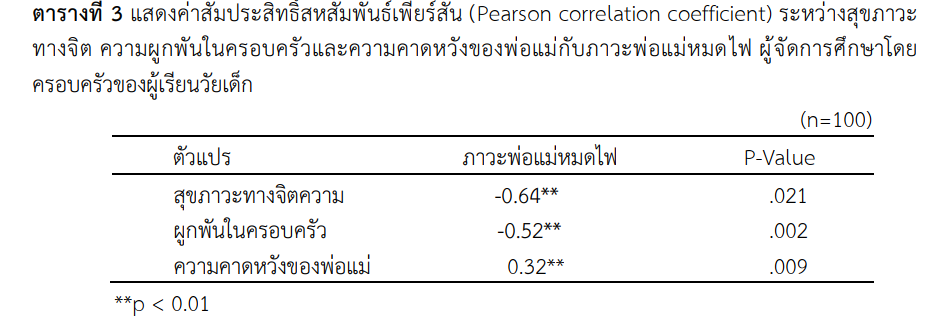สุขภาวะทางจิต ความผูกพันในครอบครัว และความคาดหวังของพ่อแม่ ที่สัมพันธ์กับภาวะพ่อแม่หมดไฟ ในผู้จัดการศึกษาโดยครอบครัวของผู้เรียนวัยเด็ก
คำสำคัญ:
การจัดการศึกษาโดยครอบครัว, ภาวะพ่อแม่หมดไฟ, สุขภาวะทางจิต, ความผูกพันในครอบครัวบทคัดย่อ
การศึกษาครั้งนี้มีวัตถุประสงค์ 1) เพื่อศึกษาระดับสุขภาวะทางจิตความผูกพันในครอบครัว และความคาด หวังของพ่อแม่ที่สัมพันธ์กับภาวะพ่อแม่หมดไฟในผู้จัดการศึกษาโดยครอบครัวของผู้เรียนวัยเด็ก 2) เพื่อศึกษาความสัมพันธ์สุขภาวะทางจิตความผูกพันในครอบครัว และความคาดหวังของพ่อแม่ ที่สัมพันธ์กับภาวะพ่อแม่ หมดไฟในผู้จัดการศึกษาโดยครอบครัวของผู้เรียนวัยเด็ก โดยใช้วิธีการวิจัยเชิงปริมาณ ใช้การสำรวจอาศัยแบบ สอบถามเป็นเครื่องมือในการรวบรวมข้อมูลจากกลุ่มตัวอย่าง จำนวน 100 คน ที่จัดการศึกษาโดยครอบครัว ของเด็กอายุ 3-12 ปี สถิติที่ใช้ในการวิจัยได้แก่ สถิติเชิงพรรณนา ได้แก่ ความถี่ ร้อยละ ค่าเฉลี่ย ส่วนเบี่ยงเบนมาตรฐาน สหสัมพันธ์เพียร์สัน
ผลการวิจัยพบว่า ระดับสุขภาวะทางจิตของผู้ตอบแบบสอบถามในภาพรวมอยู่ในระดับปานกลาง (𝑥̅ = 3.15, S.D.= 0.427) ผลความผูกพันในครอบครัวของผู้ตอบแบบสอบถามในภาพรวมอยู่ในระดับปานกลาง (𝑥̅ = 3.27, S.D.= 0.469) ผลความคาดหวังของพ่อแม่ในภาพรวมอยู่ในระดับน้อย (𝑥̅= 2.80, S.D.= 0.531) ผลภาวะพ่อแม่หมดไฟในภาพรวมอยู่ในระดับน้อย (𝑥̅= 1.92, S.D.= 0.60) ความสัมพันธ์ที่สำคัญระหว่างตัวแปรที่ศึกษา สุขภาวะทางจิตของพ่อแม่มีความสัมพันธ์ เชิงลบกับภาวะพ่อแม่หมดไฟซึ่งบ่งชี้ว่าพ่อแม่ที่มีระดับสุขภาวะทางจิตสูงกว่าจะมีระดับภาวะพ่อแม่หมดไฟต่ำกว่าความผูกพันในครอบครัวก็มีความสัมพันธ์เชิงลบกับภาวะพ่อแม่หมดไฟเช่นกันซึ่งบ่งชี้ว่าความผูกพันในครอบครัว ที่แข็งแกร่ง และระบบสนับสนุนสามารถป้องกันภาวะพ่อแม่หมดไฟในทางกลับกันความคาดหวังของพ่อแม่มีความสัมพันธ์เชิงบวกกับภาวะหมดไฟของพ่อแม่ซึ่งหมายความว่าความคาดหวังที่สูงสามารถเพิ่มความเสี่ยงของ ภาวะพ่อแม่หมดไฟได้
เอกสารอ้างอิง
Barnes, H. L., & Olson, D. H. (1985). Parent–adolescent communication and the Circumplex Model. Child Development, 56(2), 438–447. doi:10.2307/1129732
Creswell, C., O'Connor, T. G., & Brewin, C. R. (2008). The impact of parents' expectations on parenting behaviour: An experimental investigation. Behavioural and Cognitive Psychotherapy, 36(4), 483-490. doi:10.1017/s1352465808004414
Dockery, A. M., Koshy, R., & Li, I. (2022). Parental expectations of children’s higher education participation in Australia. British Educational Research Journal, 48(4), 617-639. doi:10.1002/berj.3786
Hongyantarachai, T. (2022). Basic quantitative analysis in psychology (6th ed.). Bangkok: Ramkhamhaeng University (In Thai).
Kamphuweang, A., & Naerot, P. (2019). The situation of education homeschooling. The Third National Conference on Public Affairs Management, 5, 488-498. Retrieved from https://conference.kku.ac.th/colaimg/files/articles/49bc0-o-42-.pdf (In Thai)
Keyes, C. L. (1998). Social well-being. Social Psychology Quarterly, 61(2), 121-140. Retrieved from https://psycnet.apa.org/doi/10.2307/2787065
Le Vigouroux, S., Scola, C., Raes, M. E., mMikolajczak, M., & Roskam, I. (2017). The big five personality traits and parental burnout: Protective and risk factors. Personality and Individual Differences, 119, 216–219. doi:10.1016/j.paid.2017.07.023
Meesil, N., & Puengposop, N. (2017). Learning from home: The foundations of the life and career skills in the 21st century. Journal of Social Sciences and Humanities, 43(1), 80-98. Retrieved from https://so04.tci-thaijo.org/index.php/socku/article/view/132146/99273 (In Thai)
Office of the Education Council. (2019). National Standard for Early Childhood Care, Development and Education Thailand. Bangkok: Prikwarn Graphic Company Limited (In Thai). Retrieved from https://www.oic.go.th/FILEWEB/CABINFOCENTER17/DRAWER002/GENERAL/DATA0002/00002274.PDF (In Thai)
Osgood, C. E., Suci, G. J., & Tannenbaum, P. H. (1957). The measurement of meaning. Urbana: University of Illinois.
Raudasoja, M. S., & Aunola, K. (2022). Self-esteem, socially prescribed perfectionism, and parental psychological control. Journal of Child and Family Studies, 32, 1113–1120. Retrieved from https://link.springer.com/article/10.1007/s10826-022-02324-y
Ryff, C. D., & Keyes, C. L. (1995). The structure of psychological well-being revisited. Journal of Personality and Social Psychology, 69(4), 719-727. doi:10.1037//0022-3514.69.4.719
Seginer, R., & Mahajna, S. (2018). Future orientation links perceived parenting and academic achievement: Gender differences among Muslim adolescents in Israel. Learning and Individual Differences, 67, 197-208. Retrieved from https://psycnet.apa.org/doi/10.1016/j.lindif.2018.08.009
Srichai, A., Dallas, J. C., & Hengudomsub, P. (2016). Relationships between Family Connectedness, Negative Life Event, Emotional Quotient and Mental Health Status of High School Students. The Journal of Faculty of Nursing Burapha University, 24(4), 65-76. Retrieved from https://he02.tci-thaijo.org/index.php/Nubuu/article/view/82438 (In Thai)
Srijandari, P., & Chomeya, R. (2021). A Study of Components of Adolescent Attachment in Family. Journal of MCU Peace Studies, 9(4), 1594-1602. Retrieved from https://so03.tci-thaijo.org/index.php/journal-peace/article/view/243571/169916 (In Thai)
Supchok, P. (2007). A study on expectation of parents toward educational management at Nakhon pathom vacation college. In Master’s Project, M.Ed. Srinakharinwirot University (In Thai). Retrieved from http://thesis.swu.ac.th/swuthesis/Ed_Adm/Pigul_S.pdf
Supwong, K. (2015). Self-concept, Positive thinking and Psychological well-being: A Canonical Correlational Study. Apheit Journal, 19(2), 81-91. Retrieved from https://so01.tci-thaijo.org/index.php/apheitjournals/article/view/29882/25733 (In Thai)

ดาวน์โหลด
เผยแพร่แล้ว
รูปแบบการอ้างอิง
ฉบับ
ประเภทบทความ
สัญญาอนุญาต
ลิขสิทธิ์ (c) 2024 มหาวิทยาลัยราชภัฏสวนสุนันทา

อนุญาตภายใต้เงื่อนไข Creative Commons Attribution-NonCommercial-NoDerivatives 4.0 International License.
บทความที่ได้รับการตีพิมพ์เป็นลิขสิทธิ์ของ สถาบันวิจัยและพัฒนา มหาวิทยาลัยราชภัฎสวนสุนันทา
ข้อความที่ปรากฏในบทความแต่ละเรื่องในวารสารวิชาการเล่มนี้เป็นความคิดเห็นส่วนตัวของผู้เขียนแต่ละท่านไม่เกี่ยวข้องกับมหาวิทยาลัยราชภัฎสวนสุนันทา และคณาจารย์ท่านอื่นๆในมหาวิทยาลัยฯ แต่อย่างใด ความรับผิดชอบองค์ประกอบทั้งหมดของบทความแต่ละเรื่องเป็นของผู้เขียนแต่ละท่าน หากมีความผิดพลาดใดๆ ผู้เขียนแต่ละท่านจะรับผิดชอบบทความของตนเองแต่ผู้เดียว




